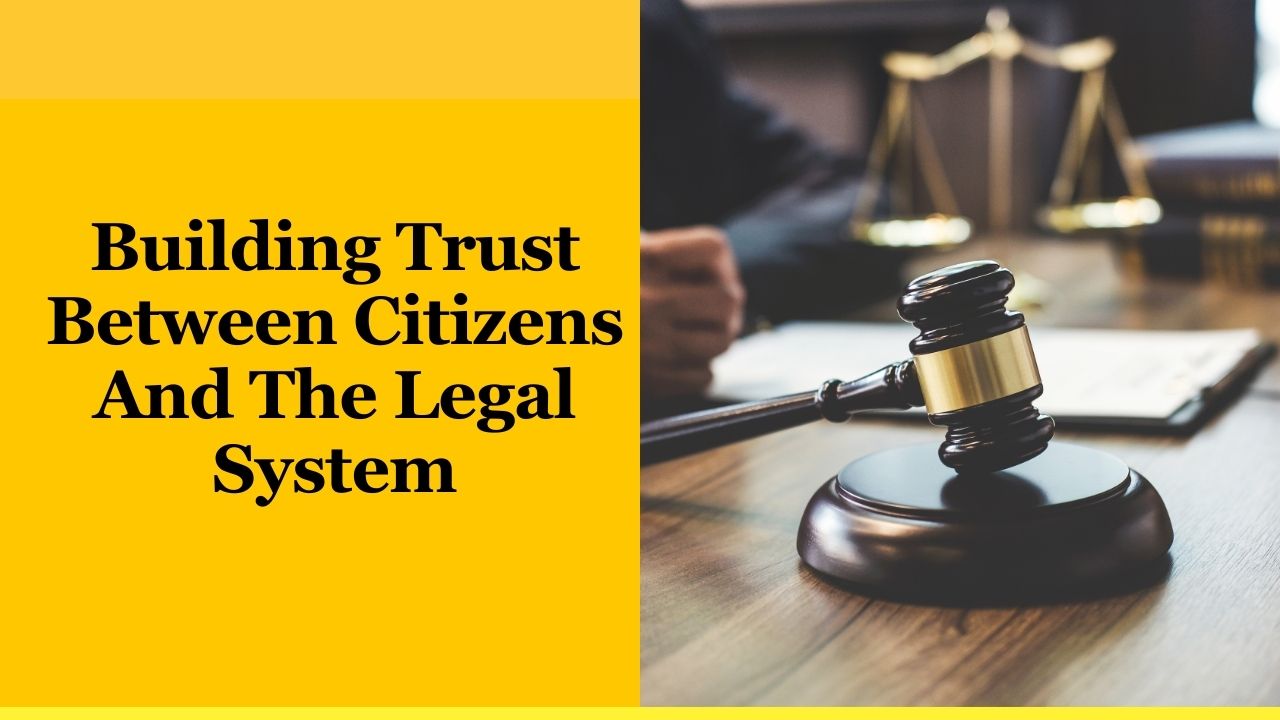In every democracy, the legal system acts as the foundation of justice, fairness, and accountability. Yet, trust between citizens and the legal system has often been strained due to perceptions of bias, inefficiency, or lack of transparency.
In 2025, as societies worldwide continue to grapple with inequality, rapid technological changes, and evolving governance, building and restoring that trust has become more important than ever.
This article explores why trust is crucial, the challenges undermining it, and the steps that governments, courts, and communities can take to strengthen the bond between people and the law.
Why Trust in the Legal System Is Essential
Trust in the legal system isn’t just about courts or judges—it is about whether ordinary people feel protected, respected, and treated fairly under the law. A trusted legal system contributes to:
- Social stability – Citizens are less likely to take justice into their own hands.
- Economic growth – Investors and businesses thrive in a system where contracts and rights are enforced fairly.
- Public safety – Communities cooperate with law enforcement when they believe in the system’s fairness.
- Democracy and governance – The legitimacy of democratic institutions depends on citizens’ faith in justice.
Challenges Weakening Trust Today
Despite reforms, several barriers continue to weaken trust between citizens and legal systems around the world:
- Lengthy Delays in Justice – Many courts are overloaded, leading to years of waiting for verdicts.
- Perception of Bias – Political influence, corruption, or unequal treatment creates a belief that justice favors the wealthy or powerful.
- Complex Legal Procedures – Citizens often find the law confusing, costly, and inaccessible.
- Police Misconduct and Overreach – High-profile cases of police brutality or unfair arrests have damaged public trust.
- Digital Divide – As courts adopt digital systems, many vulnerable groups still lack access to technology.
Building Trust: Key Steps Forward
To close the gap, governments and institutions need comprehensive reforms. Citizens, too, play a role in shaping accountability. Below are the major strategies:
1. Strengthening Transparency
- Publishing open data on court cases, judgments, and trial timelines.
- Broadcasting major hearings and increasing public access to proceedings.
- Enforcing strict anti-corruption laws and independent oversight of judges and police.
2. Simplifying Access to Justice
- Offering free legal aid and community-based legal services.
- Using technology (apps, online portals) to simplify legal forms and filing procedures.
- Expanding alternative dispute resolution (ADR) methods such as mediation and arbitration.
3. Improving Police-Citizen Relations
- Training police officers in community policing, human rights, and conflict resolution.
- Introducing mandatory body cameras for accountability.
- Creating civilian review boards to investigate misconduct independently.
4. Promoting Equal Treatment
- Ensuring that laws are applied fairly regardless of income, race, gender, or background.
- Increasing diversity among judges, lawyers, and law enforcement agencies.
- Supporting reforms that address systemic discrimination in sentencing or bail.
5. Using Technology Responsibly
- Expanding e-courts and virtual hearings to reduce delays.
- Using artificial intelligence cautiously in case management to prevent bias.
- Protecting citizens’ privacy and data rights in digital legal systems.
Examples of Reforms Worldwide
Different countries are adopting innovative approaches to restore trust. For instance:
- Singapore has launched digital courts with real-time case tracking for citizens.
- Canada has expanded legal aid funding to low-income families.
- India is pushing for faster hearings with “fast-track courts” for sensitive cases.
- United States continues to debate criminal justice reform, focusing on bail reform, sentencing fairness, and police accountability.
Citizens’ Concerns vs. Legal System Reforms
| Citizen Concern | Impact on Trust | Reform/Action Needed |
|---|---|---|
| Delayed justice | Loss of faith, frustration | Fast-track courts, digital hearings |
| Corruption or bias | Belief that law favors elites | Independent oversight, anti-corruption measures |
| Complex procedures | Citizens feel excluded from justice | Simplified forms, free legal aid |
| Police misconduct | Fear, lack of cooperation with police | Body cameras, civilian review boards |
| Inequality in sentencing | Discrimination against minorities | Sentencing reform, diverse judiciary |
| Lack of transparency | Suspicion and rumors about courts | Open data, public access to trials |
The Role of Citizens in Building Trust
Building trust isn’t only the job of courts or governments. Citizens also have a responsibility:
- Respecting the law by following legal rules and civic duties.
- Engaging in dialogue through community forums and public consultations.
- Holding leaders accountable by voting, protesting peacefully, and demanding reforms.
- Educating themselves about their legal rights to avoid exploitation.
Looking Ahead – The Future of Trust in 2025 and Beyond
As the world becomes more interconnected and diverse, the relationship between citizens and legal systems will continue to evolve. In 2025, many governments are prioritizing fair access, digital innovation, and equality to strengthen trust.
While challenges remain, the momentum toward reform is strong. The goal is not only fairer courts and safer communities, but also stronger democracies where every citizen believes in the promise of justice.
Building trust between citizens and the legal system is not a one-time effort—it requires consistent reforms, transparency, and accountability. When people feel the system is fair, accessible, and impartial, they are more willing to cooperate, follow laws, and contribute to social harmony.
In 2025, with rising costs of living, technological shifts, and global uncertainties, trust in justice has become the cornerstone of stability.
By combining government reforms, citizen responsibility, and modern innovations, societies can bridge the trust gap and create a legal system that truly serves the people.
FAQs
Why is trust in the legal system so important?
Because it ensures stability, safety, and fairness. Without trust, people may avoid courts, resist laws, or lose faith in democracy.
How can governments improve trust in the justice system?
Through transparency, fast trials, police accountability, simplified legal processes, and equal treatment for all.
What role do citizens play in building trust?
Citizens can respect laws, hold institutions accountable, educate themselves about rights, and engage in civic participation.




